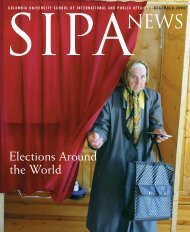Promoting IDPs' and Women's Voices in Post-Conflict Georgia
Promoting IDPs' and Women's Voices in Post-Conflict Georgia
Promoting IDPs' and Women's Voices in Post-Conflict Georgia
- No tags were found...
Create successful ePaper yourself
Turn your PDF publications into a flip-book with our unique Google optimized e-Paper software.
COUNTRY PROFILEPolitical Context<strong>Georgia</strong> has seen a turbulent past two decades. The country rega<strong>in</strong>ed its<strong>in</strong>dependence <strong>in</strong> 1991 <strong>and</strong> shortly thereafter lapsed <strong>in</strong>to civil conflictover Abkhazia; embarked on a program of accelerated state- <strong>and</strong>democracy-build<strong>in</strong>g with the Rose Revolution <strong>in</strong> 2004; <strong>and</strong> suffered amajor setback when war with Russia erupted <strong>in</strong> 2008.Establish<strong>in</strong>g a democratic <strong>Georgia</strong>n state follow<strong>in</strong>g the fall of the SovietUnion presented an enormous challenge <strong>and</strong> cont<strong>in</strong>ues to be a work <strong>in</strong>progress. Over the past eight years, current President Mikheil Saakashvilihas embarked on ambitious political <strong>and</strong> economic reforms, <strong>in</strong>clud<strong>in</strong>g re-mak<strong>in</strong>g the <strong>Georgia</strong>n police,virtually elim<strong>in</strong>at<strong>in</strong>g everyday corruption, de-regulat<strong>in</strong>g the economy, <strong>and</strong> arrest<strong>in</strong>g oligarchic bus<strong>in</strong>essfigures. However, concerns have been raised over state-supported limitations on freedom of speech,state control of the <strong>Georgia</strong>n media, <strong>and</strong> centralization of power, which has strengthened thepresidency at the expense of the legislature. 8 Issues of territorial <strong>in</strong>tegrity have compounded thechallenges of state build<strong>in</strong>g <strong>and</strong> reta<strong>in</strong> great importance <strong>in</strong> political discourse.<strong>Georgia</strong>n civil society proved its ability to have political <strong>and</strong> social impact <strong>in</strong> 2003 through its central role<strong>in</strong> the Rose Revolution. S<strong>in</strong>ce then, however, it has lost much of its national <strong>in</strong>fluence due to political,social, <strong>and</strong> economic circumstances. UNDP’s <strong>Georgia</strong> Programme Country Action Plan sums it up: “thecivil society sector is yet to become systemic <strong>and</strong> <strong>in</strong>fluence players <strong>in</strong> policy development <strong>and</strong> decisionmak<strong>in</strong>g.At the moment, the organizations lack concentration, capacity, <strong>and</strong> resources <strong>and</strong> oftenenterta<strong>in</strong> donor-driven <strong>in</strong>terest.” 9 Also, the <strong>Georgia</strong>n Government appears to be generally reluctant to<strong>in</strong>volve civil society organizations <strong>in</strong> the policymak<strong>in</strong>g process, although it has recently made certa<strong>in</strong>improvements <strong>in</strong> this area.Public confidence <strong>in</strong> civil society <strong>in</strong>stitutions other than the <strong>Georgia</strong>n Orthodox Church is quite low.While relatively few <strong>Georgia</strong>ns participate <strong>in</strong> NGOs <strong>and</strong> other civil society groups, non-<strong>in</strong>stitutionalizedparticipation (<strong>in</strong> neighborhood or community groups, etc.) is quite high, at 7.1%. 10Media freedom <strong>in</strong> particular cont<strong>in</strong>ues to be a concern, as it seems to be decreas<strong>in</strong>g <strong>in</strong> <strong>Georgia</strong>. GlobalIntegrity found <strong>in</strong> 2009 that <strong>Georgia</strong>n media, especially broadcast media, faces obstacles to produc<strong>in</strong>g8 Mitchell, 70. (“<strong>Georgia</strong> <strong>Post</strong>bellum”); De Waal, 6,9.9 Government of <strong>Georgia</strong> <strong>and</strong> United Nations Development Programme, <strong>Georgia</strong>. Country Programme Action Plan Between theGovernment of <strong>Georgia</strong> <strong>and</strong> the United Nations Development Programme, 2011-2015. Tbilisi: United Nations DevelopmentProgram, <strong>Georgia</strong>, 2011. Web. 26 Nov. 2011.10 Caucasus Institute for Peace, Democracy <strong>and</strong> Development <strong>and</strong> CIVICUS, 428

















